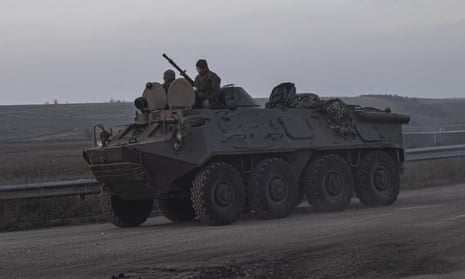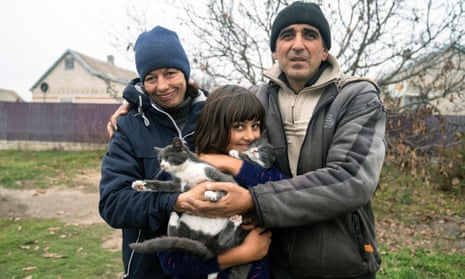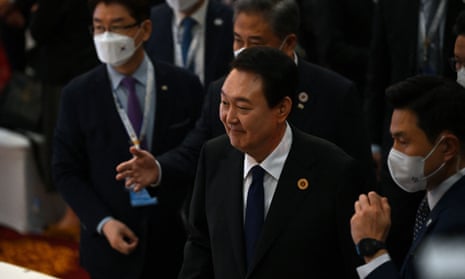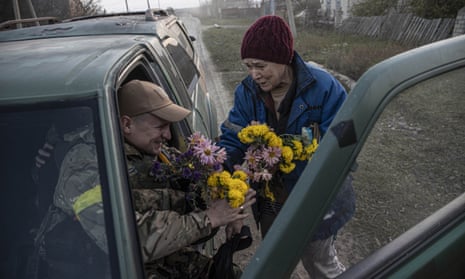Kherson humanitarian situation ‘severe’ amid water and medicine shortages – mayor
Russian forces destroyed key infrastructure in Ukraine’s southern city of Kherson before retreating, President Volodymyr Zelenskiy has said.
Before fleeing from Kherson, the occupiers destroyed all the critical infrastructure: communications, water, heat, electricity.
Kherson’s mayor said the humanitarian situation was “severe” because of a lack of water, medicine and bread, as residents celebrated their liberation in what Zelenskiy called a “historic day”.
Reuters also reported that the mayor, Roman Holovnia, told television:
The city has a critical shortage, mainly of water. There is currently not enough medicine, not enough bread because it can’t be baked: there is no electricity.
Zelenskiy said authorities had, in their efforts to stabilise the region, dealt with nearly 2,000 mines, trip-wires and unexploded shells left by the departing Russians.

Key events
The head of the Dnipro region council, Mykola Lukashuk, said the city of Nikopol, was heavily shelled overnight, according to AP.
Writing on Telegram on Sunday, he said that two women were wounded but are in a stable condition in hospital. One private house and two farm buildings were destroyed, while over 40 residential buildings, more than 24 commercial buildings, a college, a register office and electricity networks were damaged.
According to Lukashuk, the city of Marhanets also came under fire. Two private houses were damaged, but no injuries were reported. Nikopol and Marhanets lie across the Dnieper River from the Zaporizhzhia nuclear power plant, Europe’s largest.
Villagers in Pravdyne speak of relief
Ukrainians in the village of Pravdyne, near Kherson, have spoken to AFP of their relief after the Russian retreat.
After enduring more than eight months of Russian occupation, Svitlana Galak said she cried “tears of happiness” when Ukrainian soldiers arrived to liberate them.
“I don’t know when the Russians arrived, but I only know one thing – that yesterday, or the day before yesterday, I saw a Ukrainian soldier and I was relieved,” the 43-year-old told AFP. “I had tears of happiness, that finally Ukraine is liberated,” she said.
Galak is one of about 180 residents of Pravdyne, a small village, about 50 kilometres (about 30 miles) northwest of the city of Kherson, that had some 1,000 residents before the war.
Some of the roofs of buildings appear blasted off, and several homes have been destroyed. Debris of anti-mine parts and explosives litter the village’s fields – a remnant of bombing campaigns.
Kyiv’s recapture of swathes of the southern region, which serves as a gateway to the Black Sea, was also a bittersweet moment for Galak – her eldest daughter had been killed in a bombing raid on the village.
“I will tell you honestly, I was not happy that Russians were here, and my child died. It is hard for me,” she said.

Her husband Viktor spoke of mistreatment under some of the soldiers, like when he was once stopped when he went to a different part of Pravdyne to visit his mother. “The Russians stopped us and forced us to kneel,” the 44-year-old told AFP.
While questioning him on whether he really was a resident of the village, another soldier tied his arms and legs. “Then one of them came and said he was going to put a grenade under me so I wouldn’t run away,” he said.
He then told them that his daughter had already been killed and asked them: “Why do you want to put a grenade under me? Do you want to kill us all or what? What is your aim? Are you fascists?” he recounted. Luckily, before he could be interrogated, another soldier recognised Viktor and he was released.
“We were happy when we saw Ukrainian soldiers, because we are Ukrainians,” he said, adding that the occupation was also difficult due to the lack of food.
Sergei Lavrov, Russia’s foreign minister, has said the West is “militarising” southeast Asia in a bid to contain Russian and Chinese interests, Reuters reported.
Speaking during a press conference at the conclusion of the ASEAN summit in Phnom Penh, Lavrov scolded the United States over its actions in the region, which both Russia and the West see as a potential strategic geopolitical battleground in the coming decades.
“The United States and its NATO allies are trying to master this space,” Lavrov told reporters. He said US president Joe Biden’s Indo-Pacific strategy was an attempt to bypass “inclusive structures” for regional cooperation and would involve “the militarisation of this region with an obvious focus on containing China, and containing Russian interests in the Asia-Pacific”.
Biden told the summit that Washington was committed to building an “Indo Pacific that’s free and open, stable and prosperous, and resilient and secure”.
The South Korean president, Yoon Suk-yeol, vowed on Sunday to expand humanitarian assistance for Ukraine as he condemned Russia’s invasion of the country as a violation of international laws, his office said.
Yoon was speaking at the Association of Southeast Asian Nations (ASEAN) summit in Phnom Penh, Cambodia, Reuters reported.

Russia says military training will return to its schools from next year
Russia’s education minister, Sergey Kravstov, has stated that military training will return to Russian schools next September, according to the latest update by the UK’s Ministry of Defence.
The programme is supported by Russia’s Ministry of Defence, which states that no less than 140 hours per academic year should be devoted to this training.
“This reprises a Soviet-era programme where students had mandatory military training, a programme which ended in 1993. This training included contingencies for a chemical or nuclear attack, first aid and experience handling and firing Kalashnikov rifles,” the UK MoD said.
“Russian officials attempted to revive this training in 2014 following Russia’s invasion of Crimea. It was hoped that the initiative would improve the quality of conscripts. Eight years later, little has changed, and the quality of Russian conscripts remains poor, with low morale and limited training.”
It adds that this training likely intends to prepare students with military skills as they approach conscription age and to increase the take-up for mobilisation drives. The initiative is also likely to be part of “a wider project to instil an ideology of patriotism and trust in public institutions in the Russian population,” the UK’s MoD added.
Ukraine’s central bank said on Sunday it was preparing the country’s banking system to work in emergency conditions in connection with possible blackouts.
Reuters quoted the bank as saying on the Telegram messaging app:
It is envisaged to ensure the viability of 14 systemically important banks of the country. If absolutely necessary, the National Bank will primarily ensure the vital activities of state-owned banks.
Russia has systematically attacked the Ukrainian energy sector, causing blackouts for significant parts of the country.
On the road to Kherson, villagers holding flowers waited to greet and kiss Ukrainian soldiers as they poured in to secure control of the right bank of the Dnipro River on Saturday after the Russian retreat.
“We’ve become 20 years younger in the last two days,” said Valentyna Buhailova, 61, just before a Ukrainian soldier jumped out of a small truck and hugged her and her companion Nataliya Porkhunuk, 66, in a hamlet near the centre of Kherson.
But Reuters also reported that volleys of artillery fire surrounded the international airport, and police said they were setting up checkpoints in and around the city and sweeping for mines left behind.

Kherson humanitarian situation ‘severe’ amid water and medicine shortages – mayor
Russian forces destroyed key infrastructure in Ukraine’s southern city of Kherson before retreating, President Volodymyr Zelenskiy has said.
Before fleeing from Kherson, the occupiers destroyed all the critical infrastructure: communications, water, heat, electricity.
Kherson’s mayor said the humanitarian situation was “severe” because of a lack of water, medicine and bread, as residents celebrated their liberation in what Zelenskiy called a “historic day”.
Reuters also reported that the mayor, Roman Holovnia, told television:
The city has a critical shortage, mainly of water. There is currently not enough medicine, not enough bread because it can’t be baked: there is no electricity.
Zelenskiy said authorities had, in their efforts to stabilise the region, dealt with nearly 2,000 mines, trip-wires and unexploded shells left by the departing Russians.

Summary
Welcome back to the Guardian’s continuing live coverage of the war in Ukraine. I’m Adam Fulton and here’s a quick run through the latest developments as it approaches 9am in Kyiv.
-
Volodymyr Zelenskiy says Kyiv’s forces have established control in more than 60 settlements in the Kherson region and “stabilisation measures” are being carried out in Kherson city after it was retaken by Ukrainian forces. Ukraine’s president said Russian forces had destroyed all of Kherson’s critical infrastructure before they fled, including communications and water supplies along with heat and electricity supplies.
-
Ukrainians hailed Russia’s retreat from Kherson as Kyiv said it was working to de-mine the strategic southern city after the eight-month occupation and restore power across the region. In the formerly occupied village of Pravdyne, outside Kherson, returning locals embraced their neighbours, some unable to hold back tears, Agence France-Presse reported. “Victory, finally!” one said.
-
The head of Kherson’s regional state administration said everything was being done to “return normal life” to the area. Yaroslav Yanushevych said from Kherson city in a video posted to social media that while de-mining was carried out, a curfew had been put in place and movement in and out of the city had been limited.
-
Pro-Moscow forces are putting up a much stiffer fight elsewhere and the battles with Ukrainian forces in the eastern Donetsk region are hellish, Zelenskiy said. “There it is just hell – there are extremely fierce battles there every day. But our units are defending bravely – they are withstanding the terrible pressure of the invaders, preserving our defence lines,” he said.
-
Ukraine would decide on the timing and contents of any negotiation framework with Russia, according to a readout of a meeting between the US secretary of state, Antony Blinken, and the Ukrainian foreign minister, Dmytro Kuleba, at the Asean summit in Cambodia in Phnom Penh.
-
The Russian president, Vladimir Putin, has spoken to his Iranian counterpart, Ebrahim Raisi, by phone and both leaders placed emphasis on deepening political, trade and economic cooperation, the Kremlin said in a statement on Saturday. The discussion of “a number of topical issues on the bilateral agenda” also including the transport and logistics sector, the Kremlin said. It did not say when the phone call took place and made no mention of Iranian arms supplies to Moscow.
-
Significant new damage to the major Nova Kakhovka dam in southern Ukraine can be seen following Russia’s withdrawal from nearby Kherson, Reuters reported the US satellite imagery company Maxar as saying.
-
Russia said there was no agreement yet to extend a deal allowing Ukraine to export grain via the Black Sea, repeating its insistence on unhindered access to world markets for its own food and fertiliser exports, Reuters reported.








